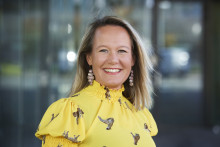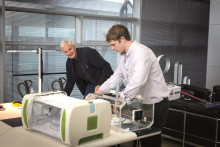Such a change requires maximum agility, both from the organisation and its employees. It calls for people who feel at home in an agile environment, who are willing and able to approach things from different points of view, learn from colleagues with a different mindset and quickly adopt new and effective behaviour. This demands curiosity and intrinsic motivation to continuously keep learning, both within and beyond one’s own domain.
That’s why I am so positive about honours programmes. They challenge students to go the extra mile – not only to broaden their knowledge and then put it into practice, but also to look at things from many different angles, and in doing so learn to appreciate other views. In fact, it’s a pity that this approach is merely reserved for honours programmes. Ideally, every student should have the chance to learn this way!
What's next?
The labour market is changing faster than ever. Skills that are in high demand today may be outdated tomorrow. Artificial intelligence and blockchain technology are hot topics right now but will soon be ‘business as usual’, and it won’t be long before data science is old school. So what’s next? And moreover, how do you keep yourself employable? At ING we encourage employees to develop their craftsmanship and to use their talents to the fullest, with a firm eye on their inner purpose. We give them access to a wide range of development tools, but they have to be enterprising and take control of their own career – just like students in honours programmes are invited to take control of their own learning curve.
Every day at ING, we see proof that people’s work is so much more rewarding and collaboration pays off so much faster thanks to agility. In our multidisciplinary teams, marketing specialists and Java developers work side by side to bring ideas to life. Innovation is so much easier and quicker, which enables us to keep our 9 million clients happy.
As far as I’m concerned, honours programmes are a great way to take a step towards bridging the gap between university and career. Thanks to honours programmes, students are more relevant and better prepared for their future working life. They are also significantly more employable, because they are inspired by challenges and are focused on further developing their talents – and that’s the kind of attitude that we, as an employer, are all too happy to have on board.
Désirée van der Geest
The writer
Désirée van der Geest is Expert Lead CoE Talent & Learning at ING. She is closely involved in the development of the Amsterdam Innovation District, an innovation ecosystem initiated by ING. She is currently exploring the possibilities of developing a minor programme in close collaboration with several universities.
Please read more about the UT Honours Programme in our latest special.







